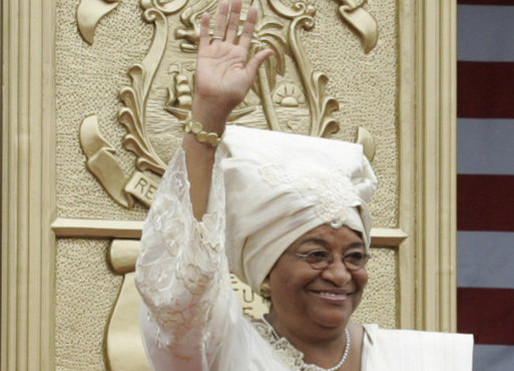As I sat in a shared taxi one morning, still groggy from having to wake up three hours before work to beat the Monrovia traffic, I was privy to an interesting conversation among the other passengers.
The subject was about why Liberia should not have another female president. They all seemed to agree with this idea, and they went back and forth, using the presumed failure of President Ellen Johnson Sirleaf’s administration to illustrate their points.
This is not my first or only time encountering this discussion, in fact, it has happened several times, and not only with strangers but also colleagues. I’ve participated in debates with individuals who are convinced that women are incapable of producing good results as leaders.
They give several easily refutable reasons, most of which have to do with their personal issues with women leaders with whom they’re familiar. It’s the classic case of negative stereotypes of a disadvantaged group being applied to all, with anecdotal cases used as a reference to justify the bigotry.
Sirleaf is too weak, they say. It’s interesting how Sirleaf has come from being Liberia’s “Iron Lady†to being too soft on corruption. The original “Iron Lady,†Margaret Thatcher, was largely viewed in a complementary light, and the attribution of the nickname to Sirleaf was in hopes that she would exhibit an unwavering resolve to steer the country in the right direction.
The argument about Sirleaf being a weak leader has some merit. It’s amazing that Liberia functions as it does, given the lack of enforcement of most of its laws. We have a sound constitution, but the laws aren’t enforced. Labor laws are largely ignored and many people, especially domestic workers and those in private industry, make less than the $75 per month that is the minimum. Crime against women are seldom prosecuted, and few rapists are actually placed in jail.
However, Sirleaf’s failures in her presidency should not be representative of all women. When I identify strong women in positions of power such as Germany’s Angela Merkel, or Ghana’s Nana Yaa Asantewaa, or even Liberia’s Mary Broh, it doesn’t matter. Debaters will then start to reminisce about how Charles Taylor kept things in order, ignoring the fact that their position is porous.
In other instances, it’s not that women in positions of power are too weak, it’s that they can be categorized as disrespectful – meaning a pattern of female leaders mistreating their subordinates or acting with little regard for the opinions of others. In this case of my fellow passengers, they pointed to Mary Broh’s actions or a specific female leader they had encountered. Never mind that many male politicians and workplace bosses behave in exactly the same manner and that behavior is viewed as “normal male behavior†whereas the suggestion is that women should be “submissive†and more nurturing.
Identifying female leaders who are respectful draws the counterargument that they’re speaking within the Liberian setting (I fault myself for not being too knowledgeable on prominent female Liberian leaders to lead a great rebuttal).
Another argument that some tend to hold strongly to is one based on the Bible, which some interpret as stating women should never lead men. The men making this argument seemed to hint at the fact that although they agree that women are capable of leading (it’s pretty hard to argue against this now, given many examples of capable female leaders), it somehow hurts their egos to be in a subservient position to a woman, merely because of her anatomy.
I asked my co-passengers if they would like their daughters to ascend to high positions within the government. They struggled to balance their daughters’ interests with their chauvinistic views but still supported their initial position, without explicitly coming out against their children’s hypothetical ambitions.
What annoys me the most is that I’ve had the same argument with women, sometimes making me wonder whether I’m the one with the crazy ideas.
In what could be interpreted as a stretch, my debaters even point to signs that Sirleaf herself agrees with them. “That’s why Ellen never leaves a female member of her cabinet in charge when she leaves the country,†I would hear them say. To this point, President Sirleaf’s cabinet doesn’t appropriately reflect confidence in female leadership. Out of her 19 current cabinet ministers, only 3 are women.
Despite the state of the country under Sirleaf’s presidency, and as little as she has done to champion women’s rights, does it make sense to appropriate one person’s job performance to half of the population?
This is not a defense of Sirleaf’s rule, but this conversation is important because she is the first elected female leader in Africa. Unfortunately, so many theories about the potential of females will rest on her performance. This is unfair because all of the 23 presidents before her were males and most objective observers would note that the majority of them performed worse than she has. Despite the power of the presidency, Liberia is still a country heavily ruled by men.
After all, this is the Liberia that has done so poorly educating our women and giving them opportunities that the literacy rate for some segments of the female population is abysmal. Although the overall literacy rate is 43%, only 17% of women ages 45─49 years are literate. We still have rules, even if informal, in many parts of the country where girls who become pregnant are asked to leave school to avoid serving as a distraction or encouragement to other students. In some cases, the men impregnating them are allowed to continue serving as teachers. On the Global Gender Gap Index 2015, which measures the level of equality of the sexes, Liberia ranks at 112 out of the 145 countries included – the bottom quartile.
All of this should tell us that we need to be doing more to promote female leaders and to better educate our women instead of holding on to cultural myths about the capabilities of women. In perpetuating these ideas, we’re only holding our country back as we limit the potentials of half of our population.
Featured photo by Shealah Craighead/White House



